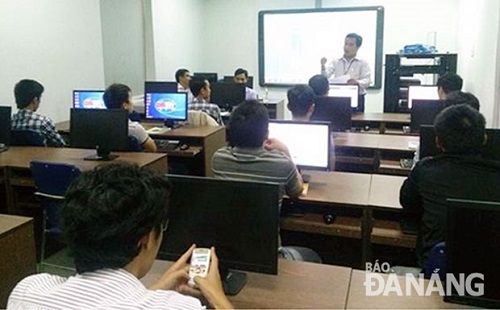Online training courses for public service workers and local citizens
Over the past 3 years, Da Nang has focused on boosting the application of information technology (IT) in administrative reforms in all local wards and communes in order to build an e-government system in the city and a modern, open and transparent administrative structure.
In order to achieve the above intention, the city is very much in need of e-government employees, e-businesses and e-citizens. Therefore, online training is considered a key method for training local government officials and employees, and local residents, at any time and in any place. In addition, the number of trainees is not limited and the training costs will be minimised in comparison with training in the conventional way.
 |
| Trainees on an online training course |
Online training courses for public service workers were initially introduced in 2013, but there has been a marked growth in the number of online trainees since 2014.
Last year, the Da Nang Information and Communications Technology Centre (DNICT) provided 9 online training courses for 1,156 local government officials and employees, businesspeople and residents. Since the start of this year, another 12 courses have been offered free-of-charge to 2,734 local businesspeople and citizens. The courses, which can be accessed around the clock, have allowed trainees to study at flexible times compared with conventional training courses.
In 2015, Lien Chieu District was the city’s first locality to be selected to online train the district’s government employees about specialised digital signatures, and it received high appreciation from them.
The DNICT has stressed the need for the city to organise more online training programmes in order to allow local government employees to do self-study and research in a flexible manner.
According to local IT experts, self-study plays a vital role in ensuring the success of the online training programmes. Special attention should be paid to installing more equipment to facilitate the study of trainees, and building national-standard online training programmes for them.
The DNICT will cooperate with the municipal Department of Information and Communications to offer an online course on information security for local IT employees.